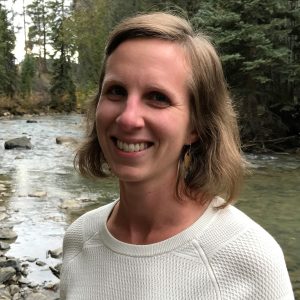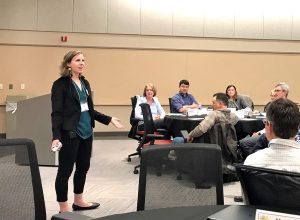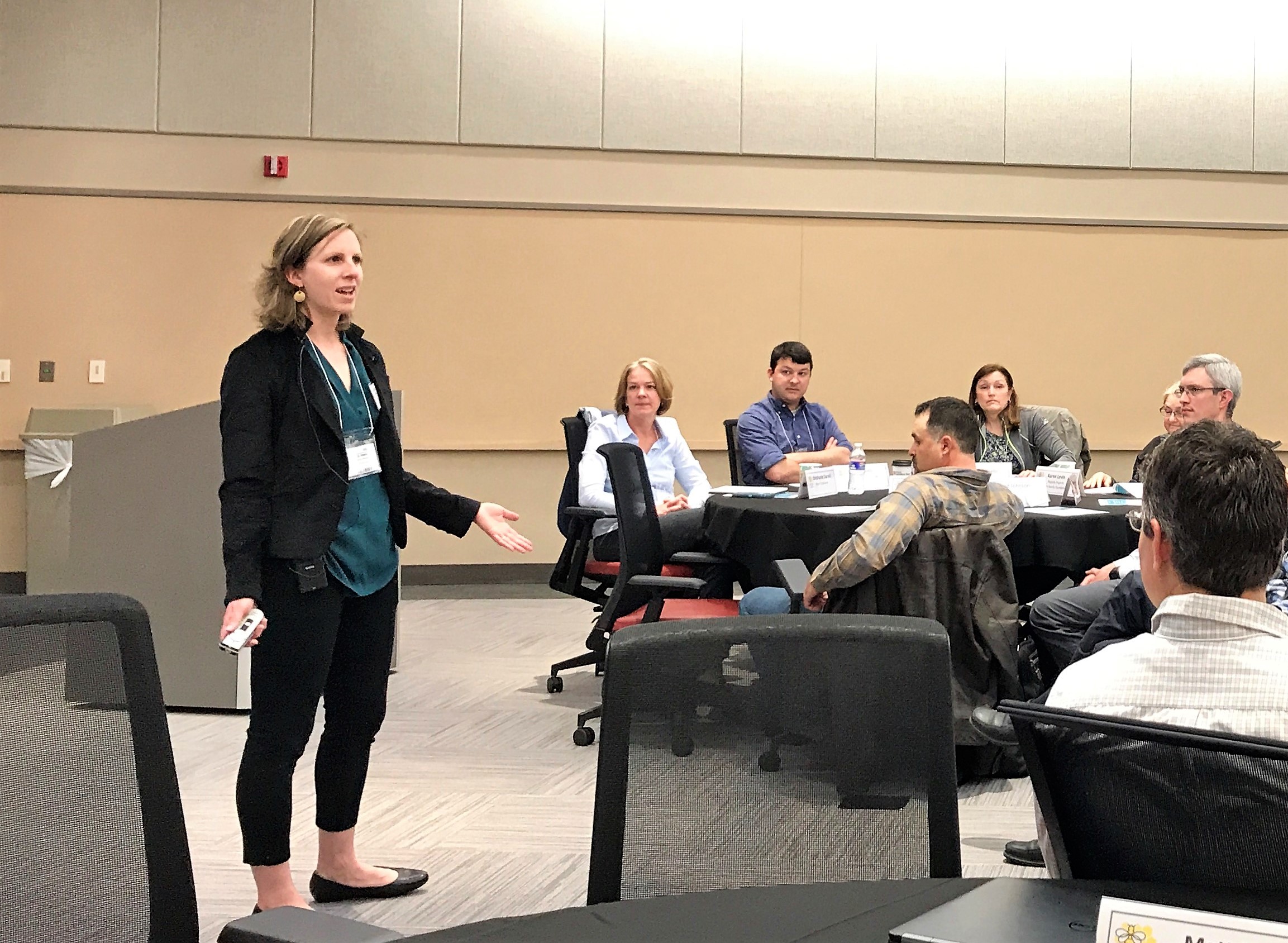Q&A with Keystone’s Julie Shapiro

Shapiro, who holds a Master’s degree in environmental studies from the University of Colorado at Boulder and Bachelor’s degrees in geosciences and English from Williams College, also worked as a science educator and policy researcher prior to joining Keystone in early 2008.
* * *
Q: What is so appealing for you about Keystone’s mission and approach?
Julie Shapiro: Throughout my time with Keystone, I have worked on a wide range of issues and projects. Every policy challenge that we work on is an opportunity to engage with a diversity of views and expertise. When I approach a project, whether it’s brand new or long-running, I’m excited by the prospect of finding collaborative solutions and bringing people together to learn from each other, reach a common goal, and establish a civil discourse.
Q: We often talk about reaching “common higher ground” as part of Keystone’s work. What do you see as essential to realizing that idea at the core of Keystone’s mission?
JS: One of the most important things we can do is provide the people around the table with the perspectives they need to have a better conversation about issues. Throughout a number of projects I’ve worked on, Keystone has done an excellent job using field trips, innovative facilitation techniques, and other experiences to draw out different perspectives and help people explore potential solutions and new ways of thinking.
Q: What are some notable examples of this process in action?
JS: We did a series of field tours and workshops with beef producers and the beef supply chain in 2013 and 2014. The purpose of these specific events on sustainable beef wasn’t necessarily to solve the challenges producers and the supply chain face, but rather to provide stakeholders along the supply chain with a better, more robust understanding of their partners’ perspectives. Through the workshops and other dialogues we facilitated, it was remarkable to see people experience the viewpoints of people on the ranch and feedlots and the processing line. What has been the most rewarding about that work has been seeing how the engagement Keystone fostered helped to build relationships and connections that have endured and shaped conversations to-date.
We’ve seen similar evolutions in thinking in our work fostering Field to Market, which is now its own independent organization, in mine cleanup efforts, in gathering public and stakeholder input on wildlife conservation strategies, in developing recommendations around oil and gas planning on public lands, and in the first year of our work with CRISPRcon and other dialogues around emerging genetic technologies.
That’s really rewarding.
Q: Throughout its history, Keystone has often worked on the cutting edge of issues. What are some new or upcoming areas where you’re excited to bring Keystone’s mission to bear upon?
JS: As I mentioned, Keystone is engaging right now with people working in and around emerging genetic technologies, like CRISPR. We’re bringing together diverse groups of stakeholders to have discussions that look beyond technical issues and to dive into some of the broader considerations of the implications of genetic editing for society. These include considerations of equity, ethics, transparency, governance, safety, and more.
Keystone has been engaged with these issues dating back to the 1990s, but our recent work has really focused on looking at this newest generation of tools from a multidisciplinary standpoint.
We know these technologies have the potential to shape the direction our society is heading. Keystone has the tools to help people understand new, diverse perspectives. We know from history that issues related to genetics can be so charged, and we need to find better ways to discuss what society wants and not merely what it can do—and, for that matter, what should it do with these revolutionary tools.
Q: What outcomes or ongoing efforts are you most proud of from your time with Keystone?

The Coalition has really succeeded in providing beekeepers, producers, and others tools and recommendations that touch on a wide range of ways to support bee health. For example, the Coalition developed and launched the Tools for Varroa Management Guide, which has really helped beekeepers confront a particularly nasty parasite that has been one of the biggest drivers of recent colony losses. We’ve similarly been working on guidance and training for crop producers and crop advisers on issues like pesticide use and habitat establishment.
I’ve also been excited about another one of the Coalition’s recent efforts, the Bee Integrated Demonstration Project. The project, which has been running for nearly a year, is particularly exciting because it not only embodies the collaborative spirit of the Coalition, but also Keystone’s mission. The Bee Integrated Demonstration Project has brought together beekeepers and producers to work together and show how best practices can be used together in agricultural landscapes to support bee health.
Q: What advice would you give to leaders in the public, private, and NGO sectors to avoid some of the pitfalls or challenges that can lead to gridlock or seemingly intractable problems?
JS: We’re in an age of such polarization where we assume that the people we disagree with are just wrong. We really need to figure out how to build bridges and see things from other sides. There’s value in taking the time to find shared interests, recognize others’ expertise, and learn to see issues from others’ perspectives. This requires empathy, compassion, and curiosity from all who come to the table.
These strategies take time, but they’re ultimately worth it.


 Effective March 1, 2025, Thomas J. Vilsack, former United States Secretary of Agriculture and Governor of Iowa, became the first Chief Executive Officer for the World Food Prize Foundation. In this new role, Governor Vilsack is focusing on expanding the Foundation’s global network, and will further position the Foundation as a leader in addressing global food and nutrition insecurity, continuing his lifetime of public service.
Effective March 1, 2025, Thomas J. Vilsack, former United States Secretary of Agriculture and Governor of Iowa, became the first Chief Executive Officer for the World Food Prize Foundation. In this new role, Governor Vilsack is focusing on expanding the Foundation’s global network, and will further position the Foundation as a leader in addressing global food and nutrition insecurity, continuing his lifetime of public service. Shelby Coffey III is a distinguished journalist, media executive, and thought leader whose career has helped shape the landscape of American news and public discourse. Over several decades, Coffey has held some of the most influential roles in journalism, including serving as editor of the Los Angeles Times, executive vice president of ABC News, and deputy managing editor of The Washington Post. His editorial leadership extended to key roles as president of CNN Financial News, editor of the Dallas Times Herald, and U.S. News & World Report.
Shelby Coffey III is a distinguished journalist, media executive, and thought leader whose career has helped shape the landscape of American news and public discourse. Over several decades, Coffey has held some of the most influential roles in journalism, including serving as editor of the Los Angeles Times, executive vice president of ABC News, and deputy managing editor of The Washington Post. His editorial leadership extended to key roles as president of CNN Financial News, editor of the Dallas Times Herald, and U.S. News & World Report. Jerry Steiner has spent 40 years involved in agriculture following growing up on a Wisconsin dairy farm. He began his career with Monsanto, in multiple business leadership roles. From 2003-2013 he served as a member of the Executive team, as the company’s Executive Vice President of Sustainability and Corporate Affairs. He led the company’s global Government, Public and Industry Affairs teams across the 70 countries where Monsanto conducts business. This experience got Jerry connected to the Keystones centers work in agriculture. Key among his responsibilities were shaping the company’s public policy and building partnerships aimed at helping farmers around the world produce more food, while conserving valuable resources like water and energy. Two unique partnership that developed under his leadership were drought tolerant corn with 5 African countries, CIMMYT and the Gates foundation, and a building a sustainable business model in Brazil with the value chain leading to significant multi-company investment and soybean varieties that can protected themselves.
Jerry Steiner has spent 40 years involved in agriculture following growing up on a Wisconsin dairy farm. He began his career with Monsanto, in multiple business leadership roles. From 2003-2013 he served as a member of the Executive team, as the company’s Executive Vice President of Sustainability and Corporate Affairs. He led the company’s global Government, Public and Industry Affairs teams across the 70 countries where Monsanto conducts business. This experience got Jerry connected to the Keystones centers work in agriculture. Key among his responsibilities were shaping the company’s public policy and building partnerships aimed at helping farmers around the world produce more food, while conserving valuable resources like water and energy. Two unique partnership that developed under his leadership were drought tolerant corn with 5 African countries, CIMMYT and the Gates foundation, and a building a sustainable business model in Brazil with the value chain leading to significant multi-company investment and soybean varieties that can protected themselves. Jennifer Morris is the Chief Executive Officer of The Nature Conservancy, leading a team of nearly 6,000 staff working in more than 80 countries and territories tackling the dual crises of the
Jennifer Morris is the Chief Executive Officer of The Nature Conservancy, leading a team of nearly 6,000 staff working in more than 80 countries and territories tackling the dual crises of the  Congressman Joe Neguse represents Colorado’s 2nd District in the U.S. House of Representatives. He was elected to his first term in November 2018, becoming the first Black Member of Congress in Colorado history. In December 2022, Rep. Neguse was elected by his colleagues to serve as Chair of the Democratic Policy and Communications Committee (DPCC), becoming the first Coloradan to serve in a senior elected leadership role in the House in over 85 years. He serves on the Natural Resources and Judiciary Committees, and was also appointed by House Minority Leader Hakeem Jeffries to serve as one of four Democrats on the prestigious Rules Committee. Rep. Neguse serves as Ranking Member on the House Subcommittee on Federal Lands, which he previously Chaired in the 117th Congress.
Congressman Joe Neguse represents Colorado’s 2nd District in the U.S. House of Representatives. He was elected to his first term in November 2018, becoming the first Black Member of Congress in Colorado history. In December 2022, Rep. Neguse was elected by his colleagues to serve as Chair of the Democratic Policy and Communications Committee (DPCC), becoming the first Coloradan to serve in a senior elected leadership role in the House in over 85 years. He serves on the Natural Resources and Judiciary Committees, and was also appointed by House Minority Leader Hakeem Jeffries to serve as one of four Democrats on the prestigious Rules Committee. Rep. Neguse serves as Ranking Member on the House Subcommittee on Federal Lands, which he previously Chaired in the 117th Congress. Llewellyn King was born in Southern Rhodesia, now Zimbabwe. He went into journalism as soon as he turned 16, stringing for Time magazine and United Press in Africa.
Llewellyn King was born in Southern Rhodesia, now Zimbabwe. He went into journalism as soon as he turned 16, stringing for Time magazine and United Press in Africa. Steven Williams is the Chief Executive Officer of PepsiCo North America, overseeing a more than $48 billion business that spans PepsiCo’s Foods and Beverage operating units. His leadership encompasses more than 125,000 associates and over 900 locations across the U.S. and Canada. Steven joined PepsiCo in 2001 as part of PepsiCo’s acquisition of the Quaker Oats Company, which he joined in 1997, and has held leadership positions of increased responsibility since.
Steven Williams is the Chief Executive Officer of PepsiCo North America, overseeing a more than $48 billion business that spans PepsiCo’s Foods and Beverage operating units. His leadership encompasses more than 125,000 associates and over 900 locations across the U.S. and Canada. Steven joined PepsiCo in 2001 as part of PepsiCo’s acquisition of the Quaker Oats Company, which he joined in 1997, and has held leadership positions of increased responsibility since.